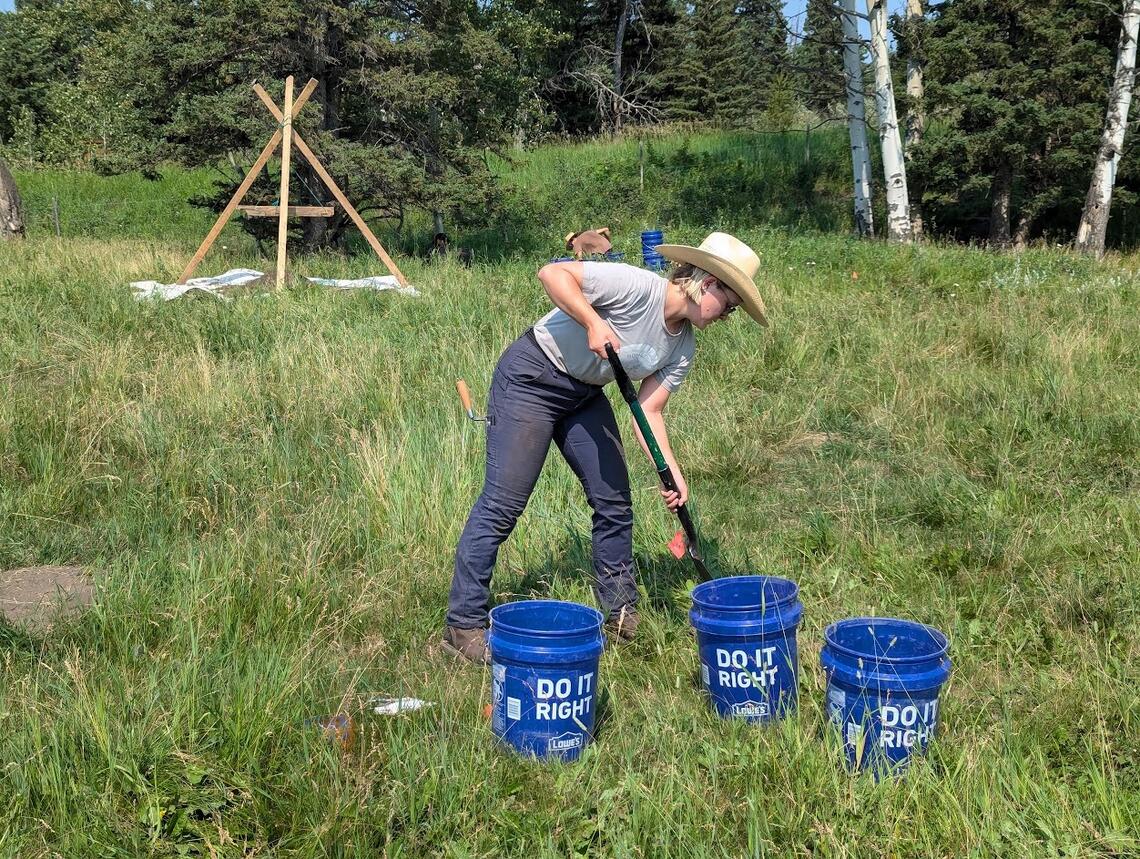Dec. 13, 2024
Digging up Alberta's history: Undergraduate research project sparks enthusiasm for Plains archaeology

Former luge athlete Sam Judson didn't know what she was getting into when she started studying anthropology and archaeology at UCalgary, but she's glad she did. Judson, a 4th-year Faculty of Arts student whose parents and grandfather are both alumni, was unsure about what to study and picked the program thinking it might be interesting.
"I really did come into the department completely blind. I had no idea what I was getting myself into. I know Indiana Jones and I think Rome's pretty cool, but I really didn't come into this from a young age thinking I was going to become an archaeologist when I grew up," she says.
Now, Judson is so passionate about archaeology she is planning on pursuing her master's in the field after she graduates in the spring. Participating in the Program for Undergraduate Research Experiences (PURE) this past summer really solidified that interest.
The idea for Judson's research project was sparked after a class in Plains archaeology where she found herself learning more about the rich archaeological opportunities right here in Alberta.
"What really made me gravitate to Plains archaeology specifically is that this is my home, too," Judson says. "I was sitting in these classes starting to learn more about Alberta and Calgary and what a hotspot it is for archaeology — I had no idea!"

Judson is passionate about sharing archaeology with Calgarians and Albertans.
Provided by Sam Judson
Judson asked herself, if she didn't know about the trove of artifacts hiding in the dirt in Alberta, who else didn't know. This led to a desire to bring this knowledge to the public.
"You really have to be in an academic setting to learn about Alberta's archaeology and that's not how it should be. My project centred around public engagement — how can we share archaeology with Calgary and Alberta?"
In the spring of 2024, Judson was part of running a public engagement program during a field school on Nose Hill. Hikers, dog walkers, and even school groups would wander by and it was Judson's role to talk to people about what they were doing, why it's important, and what they were finding. She's clear that the site they were on is not a rarity but one of potentially hundreds on Nose Hill and many more within Calgary.
Judson at the Nose Hill site in spring 2024. While on site, Judson's role was to talk to people about the work the archaeological team was doing.
Provided by Sam Judson
Following her time on Nose Hill, Judson participated in an exciting excavation at an important Albertan site, John Ware's homestead just outside of Millarville.
"The John Ware project was totally unexpected," she says. "When we were putting together the proposal, it wasn't on the radar, but it ended up being an absolute highlight of the whole research."
The John Ware project is an important step toward sharing more diverse stories about the people who are part of Alberta's history. For Judson, archaeology has a large role to play in sharing those stories and reconciliation from the effects of colonization. And sharing the knowledge through public engagement is where her passion lies
"For most people it's really hard to understand the depth of Indigenous culture and heritage in Canada without seeing it. People hear that people have been in North America for 10,000 years but when you can hold a bone that's been carbon-dated from 6,000 years, that becomes a tangible piece of history," Judson shares. "By educating the broader public on how complex Indigenous cultures and people were before the arrival of Europeans, how advanced, how much like you and me they were, and then colonization took all of that away, it's really important context for reconciliation."
Judson says leading a research project for the first time was fun — albeit overwhelming — and an opportunity to explore her own ideas and make decisions about the research.
“I knew early on that public engagement, understanding what people know about archaeology and spreading what I'm passionate about was the priority."
The creative aspect of the research process and embracing the unexpected was part of the excitement, even when doing the less glamorous work of research like a literature review. She recently presented at the 81st Annual Plains Anthropological Society (PAS) Conference in Lethbridge and, for Judson, PURE is just the first step.
"It definitely really solidified that I want to go on and do a larger research project as a masters. Creating this project, realizing how excited I was about it, participating in the research from beginning to end, has definitely really cemented that this is what I want to do, this is what I'm passionate about, this is the research I want to pursue."
The Program for Undergraduate Research Experiences (PURE) award is one of 15 awards UCalgary students can apply for with one application. Undergraduate Research Summer Studentships provide up to $7,500 of financial support to UCalgary undergraduates to conduct research for eight, 12 or 16 weeks between May and August. Applications are open to students from all faculties and all years of study, with specific opportunities for Black, Indigenous and other equity-deserving groups.
Applications close on January 27, 2025.







